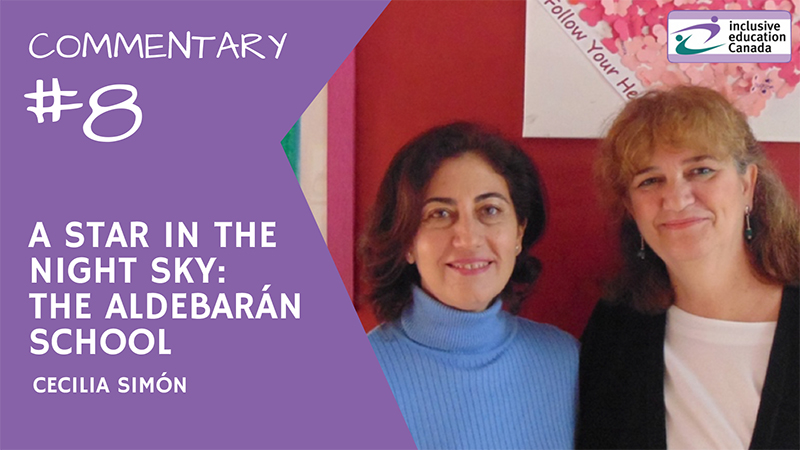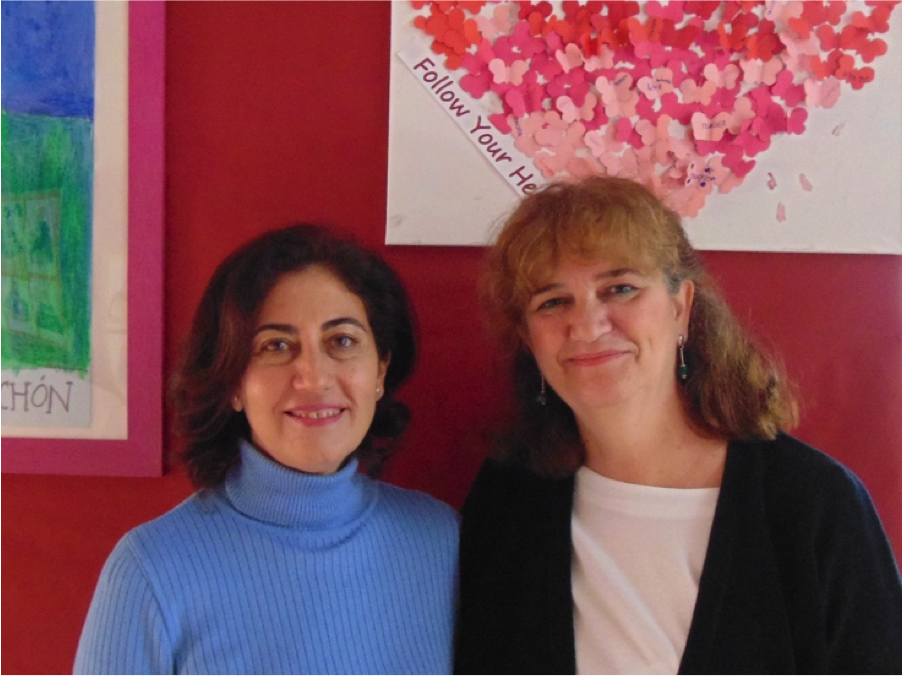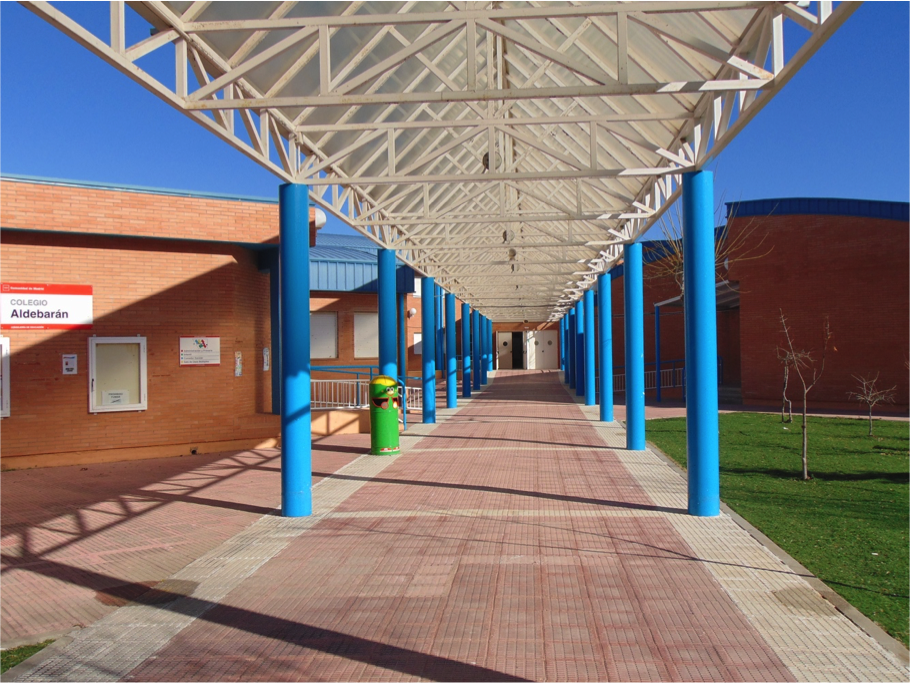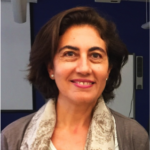 National Inclusive Education Month Commentary #8
National Inclusive Education Month Commentary #8
By Cecilia Simón, Universidad Autónoma de Madrid/ Autonomous University of Madrid
The Aldebarán School in Madrid, Spain is an example of a centre that despite the variety of difficulties that it faces, works every day to promote with equity the presence, learning and participation of every student without exclusion. Their main concern is to identify and eliminate different types of barriers that may limit the students’ right to an inclusive education, especially of those most vulnerable. For this task, it is necessary to involve the whole educational community.
The difficulties involved in facing the international challenge of building educational environments where everyone can learn and develop is such that it has become a goal of the 2030 Agenda for Sustainable Development (UN). The specific goal is to “ensure inclusive and equitable quality education and promote lifelong learning opportunities for all.” Maybe we should ask ourselves why is it so difficult for us to guarantee the right to an inclusive education to all of the children in our educational system, our schools and our classrooms?
In addition, we should ask ourselves how it is possible that in the same area coexist schools, some of which have set up these changes while others either feel incapable of doing so, are overwhelmed by the magnitude of the task, lack the proper resources or knowledge to do so.
Listening to and learning from the former may serve as an inspiration to the latter as they become aware that it is possible, and, therefore begin to consider what they can do in their schools to be more inclusive. We have the evidence and knowledge about what conditions are necessary to initiate and sustain inclusive education processes. We have witnessed the transformation of practices that schools providing leadership have produced.
 Aldebarán is the brightest star in the constellation of Taurus and one of the brightest stars in the night sky.
Aldebarán is the brightest star in the constellation of Taurus and one of the brightest stars in the night sky.
Aldebarán is precisely the name of the Madrid school that embarked on the path to inclusion. Their experience shows others how to proceed. Honouring its name, the school is indeed a star that shines a bright light in the dark. Despite obstacles and in the face of discouragement, Aldebarán’s position is that there is “no turning back.”
To explore this school’s experience further, I interviewed Aldebarán principal Sonia González. She shares what motivated her to undertake this process that has made the move to inclusion possible, as well as the complex challenges she faces as a principal.
 What has motivated you during this process?
What has motivated you during this process?
The Aldebarán School was inaugurated 24 years ago to meet the schooling needs of a growing municipality. It was done so in an improvised manner without a building and with new staff that would serve students at all levels from 2 or3 to 14 years of age. The beginning was difficult. We had to create a team and generate a sense of educational identity in a school with new teachers with different methodological approaches and direction imposed by the administration. Nevertheless, we shared a common belief that it was our school and it would be as we want it to be. From this point onward, drawing from our own previous experiences, in addition to the personal values that empowered the group, we have helped Aldebarán to shine bright.
The school’s students have always presented such diverse characteristics that, since the beginning, we had to organize the materials and human resources to meet everyone’s needs.
We all needed to be valued and respected and at the same time feel part of the group. Hence, we created a double line of action, “be unique and belong,” aimed to ensure everyone grows and feels good. This project was strengthened 12 years ago with the incorporation of students with ASD who were not originally enrolled in the school. At that time, we became more aware of our commitment and responsibility and began to recognize ourselves as an inclusive school.
Our strength lies in the coexistence of diverse students, the value of team work, the trust, support and participation of families, the sensitivity and respect of all to be attentive and know how to listen with their hearts and “speak without words”.
Our children appreciate differences and naturally interact, recognize and support each other – Through this they grow as people.
 What made it possible?
What made it possible?
We are an educational community that promotes open communication and participation of everybody in order to offer the best care to each and every child.
We follow the principles of a systemic school in which each student is unique and important for the functioning and well-being of the whole and thus achieving the best results for learning in all areas of cognitive and socio-emotional development.
We approach our classroom convinced and sure of what we do. We know that we have the support, appreciation and recognition of the educational community. We are committed to offer the best to achieve our common goals …. And it works!
What are the main barriers and challenges you have faced as a principal?
Among the barriers that I have encountered are:
- The lack of sensitivity and interest of the administration for policies coherent with what we understand by inclusive education.
- The existing schooling policies for students with special educational needs.
- Little social recognition by the educational authorities for the work we are doing and the results we are obtaining.
- The competition between schools to attract “clients” in the locality due to the decrease in the child population in the area, which has meant the closure of units and rumours of the school’s closure.
My main challenges have been:
- To make all staff aware of the importance of our responsibility in this process and the importance of serving everyone in an inclusive manner
- To make families see that diversity is a social wealth that favours the personal development of each individual in qualities such as respect, appreciation and supportive behaviours.
- To explain that inclusion in the classrooms does not harm the learning of those who do not have special educational needs
At all times I have remained firm in my convictions and been supported by an educational community that shares the same beliefs and direction. With the intention of respecting and being faithful to my ethical principles, I opted for a democratic and participative management style that I defend with very satisfactory and gratifying results.
As a principal,
- I am attentive, listen, make proposals and value others explicitly.
- I provide the necessary resources – didactic materials, methodological flexibility, groupings, spaces, times – in addition to ongoing training, observing other schools, contacting other teachers and facilitating the exchange of experiences.
- Despite the decrease in participation in official projects, we have achieved extraordinary funds that make it possible to acquire the appropriate materials.
- Human resources management is complicated. We cannot choose or expand the template; however, we work in a coordinated way with great enthusiasm, efficiency, teamwork. We share and offer reinforcement and extra support in the classroom with colleagues when necessary.
- We anticipate problems with preventive measures and resolution protocols in cases of conflict that favour a climate of peaceful coexistence.
- Although we have sometimes felt like throwing in the towel, we have never given up. We continue strongly defending what we believe in and what maintains our motivation to develop an inclusive Aldebarán School; we follow our star.
To make the right to inclusive education a reality, is a task that, as the principal of this school again confirms, is complex with many challenges, barriers and multiple ethical dilemmas. Nevertheless, it is worthwhile. We are talking about actions that improve the present and future quality of life of children, and also of all those around them including families and the many professionals who day after day try to make it happen. We speak, in short, of the construction of a more just society that reflects the society we want future generations to live in. And this is a task that is worth working for!
 Cecilia Simón, Department of Developmental and Educational Psychology Universidad Autónoma de Madrid/ Autonomous University of Madrid (Spain); Centro de Educación Infantil y Primaria (CEIP) Aldebarán (Madrid, Spain), Principal: Sonia González López.
Cecilia Simón, Department of Developmental and Educational Psychology Universidad Autónoma de Madrid/ Autonomous University of Madrid (Spain); Centro de Educación Infantil y Primaria (CEIP) Aldebarán (Madrid, Spain), Principal: Sonia González López.
